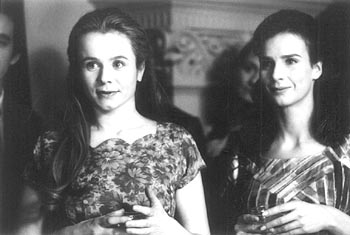![[Metroactive Movies]](/movies/gifs/movies468.gif)
[ Movies Index | Metro | Metroactive Central | Archives ]
Sister Sounds
 Cello Folly: Cellist Jackie (Emily Watson, left) outplays her flautist sister, Hilary (Rachel Griffiths), in Anand Tucker's sophisticated weepy. Musical prodigies 'Hilary and Jackie' grow up in sophisticated real-life weeper By Michelle Goldberg OVERFLOWING with weeping strings, spiraling cameras and grandiose concert palaces, Hilary and Jackie is a sophisticated woman's weepy, a real-life story of betrayal, tragedy and redemption unfolding in beautifully genteel surroundings. Based on the memoirs of Hilary and Piers Du Pré, brother and sister of the famous cellist Jacqueline Du Pré (who died young of multiple sclerosis), Hilary and Jackie follows the sisters from their sheltered, cultured childhoods through their wildly divergent adulthoods. The film begins in a fantasy of fresh, innocent girlhood, as the young Hilary and Jackie gambol on an empty beach. At home, their lives seem equally magical, filled almost wholly with music, dance and camaraderie. Early on, the older sister, Hilary, a flautist, is the one who shines--in fact, Jackie practices her cello only so she can attend recitals with her sister. Eventually, Jackie's genius kicks in, though one of the film's conceits is that she never loves the cello, only the love the cello brings her. Soon, the grownup Jackie, played by the stunning Emily Watson (Breaking the Waves), is off on a whirlwind career. Hilary (Rachel Griffiths), however, grows up to be awkward and plain, and she loses the spark that animated her flute playing. The middle portion of the film is divided in half, with the same period shown first from Hilary's point of view, then from Jackie's. Hilary bears her jealousy over Jackie's success stoically and settles down to a happy but utterly country average life with a gregarious fellow music student. Jackie, meanwhile, triumphs but is desperately lonely. One almost wishes the director had let us see her take some joy in her genius--instead, she pines for home and seems to appreciate her gift only when it seduces Daniel Barenboim (James Frain), the sultry Jewish piano prodigy who becomes her husband. The film is presumably nonfiction, yet there's still something condescending in Jackie's passive indifference to her art--an indifference almost never seen in movies about male geniuses. Jackie's behavior also grows erratic and even cruel, but we're never quite sure where her manias come from. Still, no performer radiates rapture the way Watson does, and the concentrated passion in her eyes when she's playing belies the idea that Jackie didn't care for her music. The relationship between the sisters is engrossing and incredibly warm but with a hostile undercurrent of competition. Regrouping in Hilary's country house, Jackie convinces her sister to share her husband with her. Here, the film turns into a fascinating love triangle in which Hilary's long-suffering saintliness begins to seem like a neurotic masochism to match Jackie's towering narcissism.
Hilary and Jackie (R; 120 min.), directed by Anand Tucker, written by Frank Cottrell Boyce, photographed by David Johnson and starring Emily Watson, Rachel Griffiths, David Morrissey, Auriol Evans and Keeley Flanders. [ San Jose | Metroactive Central | Archives ]
|
From the January 28-February 3, 1999 issue of Metro.
Copyright © Metro Publishing Inc. Maintained by Boulevards New Media.